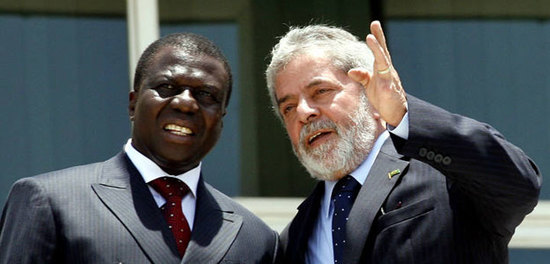
Brazil’s President Lula and Guinea-Bissau’s President João Bernardo Vieira (2007), two year before Vieira was assassinated.
How do rising powers such as Brazil engage in democracy promotion within the context of political instability in Africa? Do these approaches differ from those of European and American practices? These questions matter greatly. The value of exports from developing countries to other developing countries (South-South trade) now exceeds exports from poor countries to rich ones (South-North trade). By comparison, in 1985, South-South trade only accounted for 7 percent of overall trade. In the same way, South−South development cooperation has increased dramatically over the past years, and it is, particularly in the West, often described as “rogue aid” – focused on national sovereignty and non-conditionality. The rise of non-traditional actors in Africa is seen by many as bad news for democracy on the continent.
A new article in Africa Review by Adriana Abdenur and Danilo Marcondes about Brazil’s attempts to promote human rights and democracy in Guinea-Bissau is thus a welcome contribution, shedding light on an interesting case study that remains largely unknown — even in Brazil.
Contrary to common perceptions, the authors claim that democracy promotion is not a purely Western endeavor. They argue that Brazil’s initiatives in this area are channeled via three interrelated strategies: its multilateral engagement, especially through the Community of Portuguese-Speaking Countries (CPLP) and the UN Peacebuilding Commission; the bilateral cooperation coordinated by the Brazilian Cooperation Agency (ABC); and trilateral cooperation efforts, such as those carried out in partnership with the United States. In fact, the authors go so far as to affirm that Brazil made institution-building an essential component of development and security efforts to stabilize the country – contrasting its usual reluctance to intervene in other countries’ internal affairs.
So, considering the delicate task of striking a balance between its positions on sovereignty and its engagement with democracy and human rights, how exactly is Brazilian democracy promotion different from that of established democracy promoters? Or is the government’s talk of a “Brazilian approach” just empty rhetoric?
Abdenur and Marcondes affirm that
perhaps the biggest difference between Brazil’s approach to democracy and human rights promotion and that of Northern aid is that Brazil refrains from making these programs into political conditionalities for development cooperation. Instead, these projects are presented as part of a broader (and primarily demand-driven) state-building effort geared to stabilize the situation in Guinea-Bissau, while gently nudging the country in the direction of democracy.
The article contains a list of very interesting initiatives undertaken by Brazil – principally during the past decade – such as sending missions to observe elections and donating computers for voter registration. Brazil also actively worked to keep Guinea-Bissau on the UNSC agenda. In addition, Brazil’s Cooperation Agency finances several small projects, as does the IBSA Fund. Interestingly enough, the authors also cite Brazil’s interest in helping Guinea-Bissau reform its bloated army by creating opportunities for members of the Armed Forces to retire, allowing for the renewal of military officers, and helping make those forces more professional.
While highly informative, the text raises several questions about how exactly Brazil’s approach in Guinea-Bissau differs from that of other countries. For example, the authors mention that Brazil recently spent US$ 2.8 million on cooperation in the country – yet it would be interesting to know how that compares to donations from other countries. Is Brazil one of the major donors in the country, or is its financial contribution minor? This information would be crucial to assess the political clout Brazil really possesses in Bissau.
The authors cite an influential policy maker who says Brazil enjoys “enormous credibility” in Africa – yet what exactly are the sources of that credibility? The Brazilian government frequently points to Brazil’s popularity in Africa, yet are there ways to actually corroborate this? Are there examples of how this credibility translates into actual influence among the local population or the elites?
Abdenur and Marcondes speak of a “Brazilian approach toward state-building”, implying that Brazil has adopted a somehow unique strategy. Yet it remains somewhat unclear what exactly the elements of this strategy are in practice. Has Brazil’s approach been particularly successful? If so, have other donors recognized it as such, and can they learn from it? Granted, these are many complex questions impossible to address in one article alone. The authors make a brief comparison between Brazil and other donors in the country, arguing that “in contrast to the American and European approaches, Brazil is hesitant to reduce Guinea-Bissau to the simplistic label of ‘narco-state’”. Yet there is evidence that established donors such as the EU are engaged in many aid projects unrelated to drug-trafficking.
The authors rightly conclude that more research into Brazil’s democracy and human rights promotion efforts elsewhere on the African continent and with partners of different types of regimes is needed to gain a fuller picture of how (and whether) Brazil is increasingly relevant to socioeconomic change in the African continent. This case study is an excellent first step.
Read also:
What is Brazil doing in Africa?
Book review: “Building BRICS: The new scramble for Africa” by Barbara Njau
Photo credit: Jamil Bittar/Reuters








